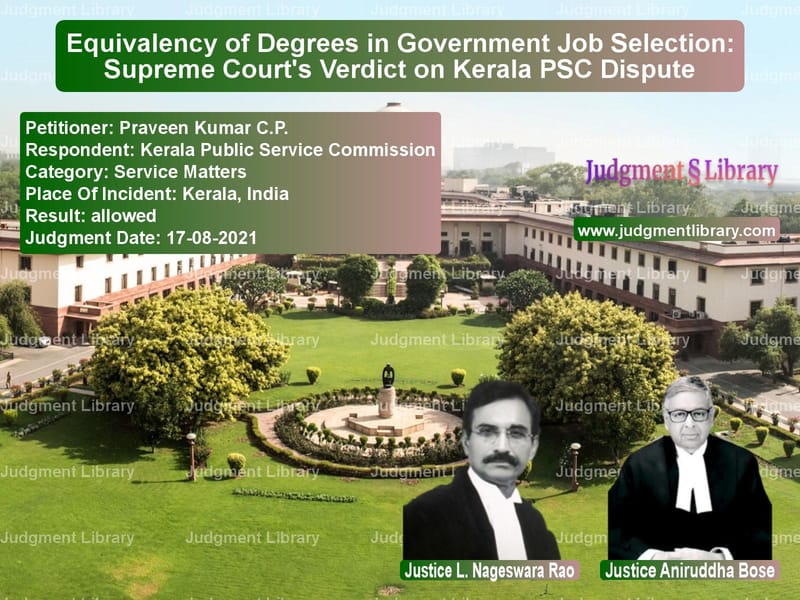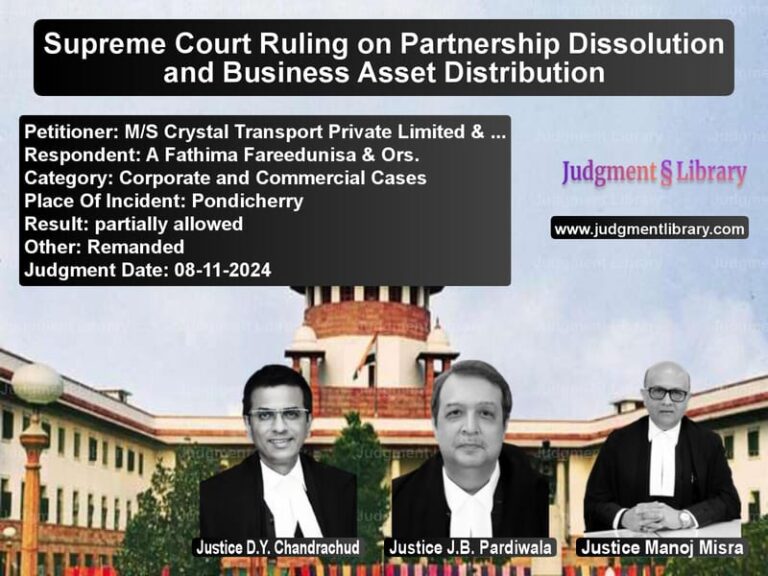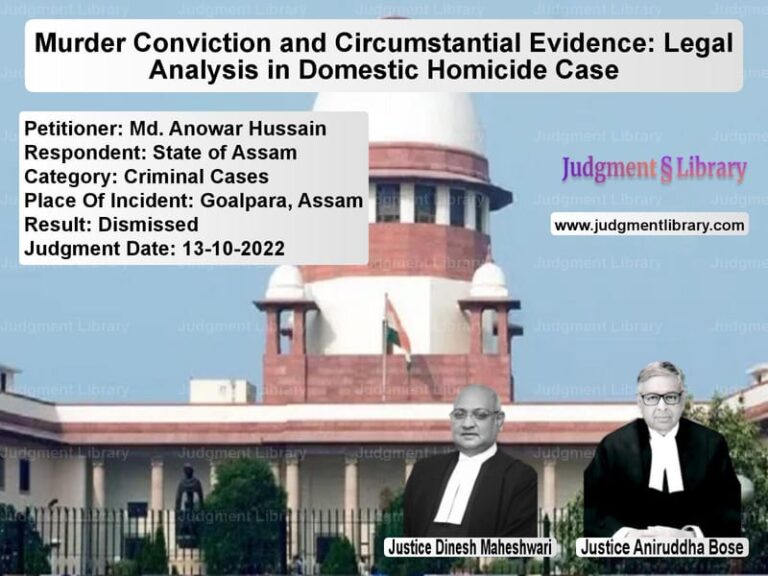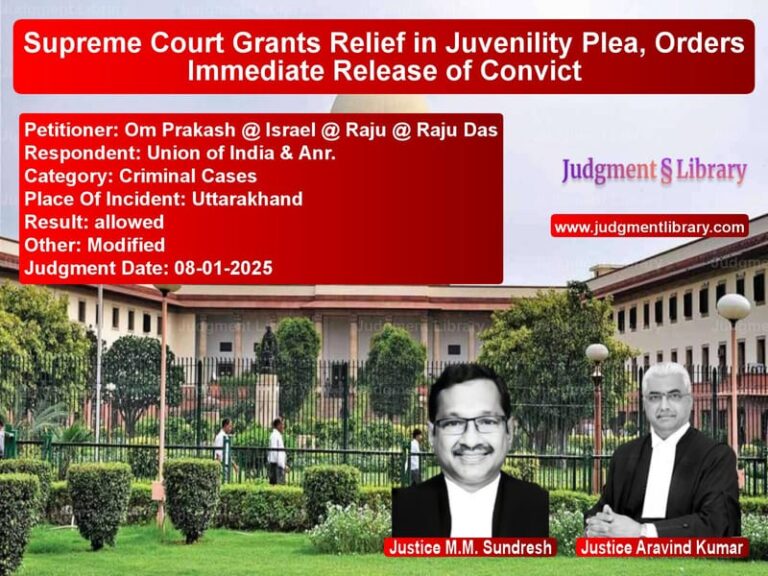Equivalency of Degrees in Government Job Selection: Supreme Court’s Verdict on Kerala PSC Dispute
The case of Praveen Kumar C.P. vs. Kerala Public Service Commission revolves around the eligibility criteria for the post of High School Assistant (Natural Science) in the State of Kerala. The Supreme Court’s decision in this matter provides clarity on whether equivalency orders issued after an employment notification can be applied retrospectively.
The appeal was filed by two candidates, Praveen Kumar C.P. and P. Anitha Devi, who had applied for the post under the Kerala Public Service Commission (KPSC). Their applications were initially accepted, but their names were later withheld from the ranked list on the grounds that their B.Ed. degrees were not in the ‘concerned subject’ as required by the job notification.
Background of the Case
The dispute began when KPSC issued separate employment notifications for High School Assistant (Natural Science) in Malayalam medium (2012) and Tamil medium (2014). The notifications specified the required educational qualifications:
- A degree in the concerned subject.
- A B.Ed. or BT degree in the concerned subject, recognized by Kerala universities.
- The concerned subject was defined as Botany, Zoology, Home Science, or Microbiology.
Both candidates had B.Ed. degrees in Biological Science, obtained from universities outside Kerala. While these degrees were recognized by Kerala universities as equivalent to B.Ed. (Natural Science), the KPSC rejected their applications, arguing that equivalency orders issued after the notification date could not be applied retroactively.
Petitioner’s Arguments
The petitioners contended that:
- Their B.Ed. degrees were equivalent to the required qualification as confirmed by Kerala universities.
- The government of Kerala had issued equivalency orders specifically stating that their degrees were equivalent to B.Ed. (Natural Science).
- Since equivalency is a matter of factual recognition, it should apply from the date they obtained their degrees and not from the date of the government order.
- The rejection of their applications constituted an arbitrary change in the ‘rules of the game’ after they had already participated in the selection process.
Respondent’s Arguments
The KPSC and the Kerala government defended their decision by arguing:
- Equivalency orders were issued after the employment notifications and could not be applied retrospectively.
- The selection process must follow the criteria specified in the employment notification at the time of its issuance.
- Allowing such equivalency claims would be unfair to other candidates who may not have applied, believing themselves ineligible.
- The Supreme Court in Zonal Manager, Bank of India v. Aarya K. Babu (2019) had ruled that qualifications not included in the original notification could not be accepted later.
Key Legal Considerations
The Supreme Court examined the following issues:
1. Equivalency Orders and Retrospective Application
The Court noted that equivalency does not create a new qualification but recognizes an existing one. Since the Kerala universities had already treated the petitioners’ degrees as equivalent before the job notification, the government orders merely clarified this fact.
Read also: https://judgmentlibrary.com/seniority-in-government-jobs-supreme-court-ruling-on-ad-hoc-service/
2. ‘Rules of the Game’ Doctrine
The Court distinguished this case from others where eligibility rules were changed mid-selection. It ruled that confirming equivalency was not the same as changing eligibility criteria.
3. Fairness in Public Employment
The Court balanced the need for transparency in job selection with the rights of candidates whose degrees were wrongly excluded. It held that denying selection to candidates who already held an equivalent qualification was unjust.
Court’s Observations
The Supreme Court made the following key observations:
“The word ‘equivalence’ in its plain meaning implies something which is equal to another. In the field of academics, application of the principle of equivalency in relation to degrees in two subjects would mean that they had the same standing or status all along, unless the official instrument according equivalency specifies a date from which the respective subjects would be treated as such, in express terms or by implication.”
It further stated:
“The subject GOs only recognized an existing state of affairs so far as the nature of the degrees were concerned and did not create fresh value for the degrees which the appellants possessed.”
Final Verdict
The Supreme Court allowed the appeals, ruling that:
- The equivalency orders issued by the Kerala government must be applied retrospectively.
- The petitioners’ names must be restored to the ranked list.
- If they qualified for appointment, they must be treated as if they were in service from the date of their original appointment.
The Court concluded:
“The judgments under appeal are accordingly set aside and the orders of the Tribunal dated 20th September 2019 and 2nd September 2019 shall stand restored.”
Implications of the Judgment
This ruling has significant implications for government job selection processes:
- Recognition of Equivalency: Universities’ recognition of equivalency should be given due consideration in public employment.
- Protection of Candidates’ Rights: Candidates cannot be denied employment based on an arbitrary interpretation of qualifications.
- Judicial Review of Recruitment Rules: Courts can intervene when selection criteria are applied unfairly.
- Clarity for Future Recruitment: Government orders confirming equivalency should explicitly state whether they apply retrospectively or prospectively.
The Supreme Court’s ruling ensures that candidates with valid equivalency cannot be unfairly excluded from public employment.
Petitioner Name: Praveen Kumar C.P..Respondent Name: Kerala Public Service Commission.Judgment By: Justice L. Nageswara Rao, Justice Aniruddha Bose.Place Of Incident: Kerala, India.Judgment Date: 17-08-2021.
Don’t miss out on the full details! Download the complete judgment in PDF format below and gain valuable insights instantly!
Download Judgment: praveen-kumar-c.p.-vs-kerala-public-servic-supreme-court-of-india-judgment-dated-17-08-2021.pdf
Directly Download Judgment: Directly download this Judgment
See all petitions in Recruitment Policies
See all petitions in Public Sector Employees
See all petitions in Employment Disputes
See all petitions in Education Related Cases
See all petitions in Workplace Harassment
See all petitions in Judgment by L. Nageswara Rao
See all petitions in Judgment by Aniruddha Bose
See all petitions in allowed
See all petitions in supreme court of India judgments August 2021
See all petitions in 2021 judgments
See all posts in Service Matters Category
See all allowed petitions in Service Matters Category
See all Dismissed petitions in Service Matters Category
See all partially allowed petitions in Service Matters Category







